Have you ever wondered why your chickens might have diarrhea? It’s a common issue that can mean there’s a health problem. But don’t worry, you can handle it with the right knowledge and steps. Knowing the causes, signs, and how to treat chicken diarrhea is key.
There are many reasons why chickens might get diarrhea. These include worms, viruses, bacteria, and not eating right. Finding out what’s causing it helps you fix it. Are you ready to learn how to keep your chickens healthy?
Key Takeaways
- Diarrhea in chickens can be caused by various factors, including worms, viruses, bacteria, and nutritional imbalances.
- Recognizing the signs and symptoms of diarrhea, such as loose or watery droppings, is crucial for prompt diagnosis and treatment.
- Common diarrhea-causing diseases in chickens include coccidiosis, Marek’s disease, and Gumboro disease, each requiring specific management strategies.
- Implementing proper biosecurity measures, maintaining a balanced diet, and providing a clean, stress-free environment can help prevent diarrhea outbreaks.
- Consulting a veterinarian is recommended for severe or persistent cases of chicken diarrhea to ensure accurate diagnosis and effective treatment.
Understanding Chicken Diarrhea
Diarrhea in chickens is a common issue that owners should know about. It’s important to recognize the signs of chicken diarrhea. This helps in diagnosing chicken diarrhea and treating poultry digestive disorders.
Signs and Symptoms of Diarrhea in Chickens
Chicken diarrhea means having three or more watery stools in a day. It can look like loose droppings or a dirty vent area from watery feces.
Other signs include being tired, eating less, losing weight, and having ruffled feathers. Watching your chickens closely can help spot chicken diarrhea.
Normal vs. Abnormal Chicken Droppings
Knowing what normal chicken droppings look like helps with diagnosing chicken diarrhea. Normal droppings are brown or gray with a white top. But, abnormal droppings can be watery, milky white, or even have blood, showing health problems like poultry digestive disorders.
Changes in droppings color, consistency, and how often they come out can tell you a lot. For example, green or yellow diarrhea might mean a bacterial or viral infection. Blood in droppings could mean parasites.
“Paying close attention to your chickens’ droppings can be a crucial diagnostic tool in identifying the root cause of their digestive issues.”
Common Causes of Diarrhea in Chickens
Diarrhea is a common issue in chickens, along with respiratory problems. It’s important for owners to know why this happens. Worms, viruses, and bacteria are main causes of diarrhea in chickens.
Worm Infestations
Worms don’t usually cause diarrhea on their own. But, a lot of them can lead to secondary bacterial diarrhea. This messes up the balance in the gut, causing loose, watery stools. Keeping your flock clean and deworming regularly helps prevent this.
Viral and Bacterial Infections
Some viruses, like rotavirus and adenovirus, can hurt the chicken’s intestines, causing diarrhea. Bacterial infections also upset the balance of good and bad gut bacteria. This can happen from bad food, stress, or a weak immune system.
Other illnesses, like coccidiosis and Marek’s disease, can also cause diarrhea. Keeping an eye on your flock’s health, treating problems fast, and preventing them is key. This helps keep your chickens healthy and lowers the risk of digestive issues.
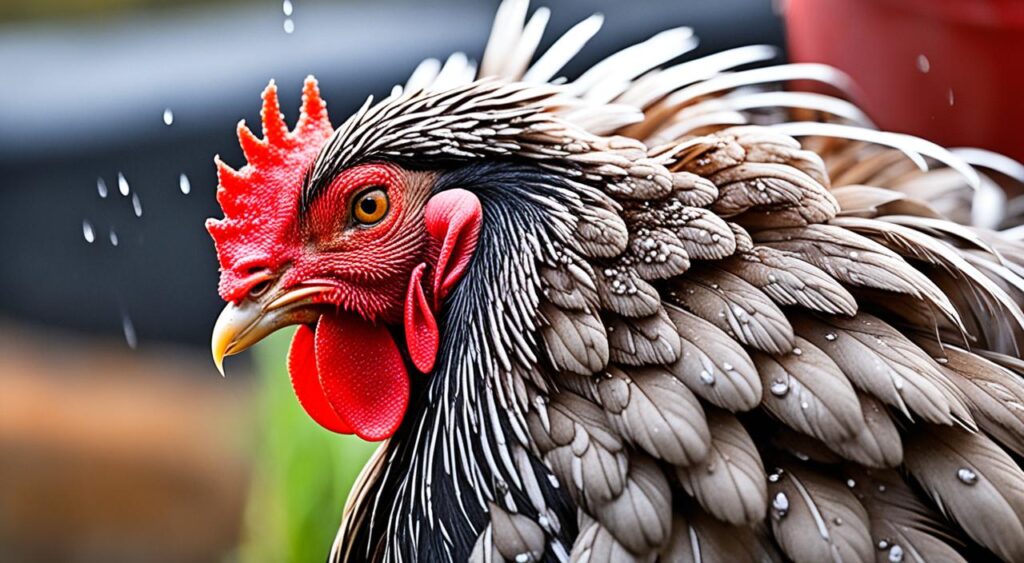
“Diarrhea in chickens has harmful effects including nutrient malabsorption, lethargy, weight loss, dehydration, and potential blood poisoning leading to death.”
Fixing the root causes of chicken diarrhea causes and treating them right is vital. It keeps your poultry healthy and productive.
diarrhea in chickens
Diarrhea is a common health issue in chickens. It can be caused by many things, like parasites, viruses, or bacteria. It’s important to know the signs, causes, and how to prevent and treat it to keep your chickens healthy.
Chickens can get diarrhea from drinking too much water, especially in hot weather or if they eat too many worms. Stress, like when new chickens join the group or when they move to a new home, can also cause it. Eating food that has too much protein can make their droppings watery.
Worms can irritate a chicken’s stomach and cause diarrhea. Coccidiosis, a disease, can make their droppings bloody or greenish, especially in young chickens. Viruses and bacteria can also hurt a chicken’s gut and cause diarrhea, especially if their diet changes suddenly or their water is dirty.
Kidney problems in chickens can make their droppings loose by mixing more urine with waste. If you notice diarrhea in your chickens, watch for other signs of illness and get vet advice if needed.
Preventive Measures and Treatment Options
To prevent diarrhea in chickens, feed them the right food, give them clean water, keep their living area clean, reduce stress, and know about common chicken diseases. If your chickens have diarrhea, you might need to give them supplements like yogurt, probiotics, electrolytes, or Gatorade, depending on the cause.
“Regularly monitoring and addressing diarrhea in chickens is essential to prevent dehydration and other complications associated with the condition.”
In summary, diarrhea is a common issue in chickens with many possible causes. By understanding the signs, causes, and how to prevent and treat it, you can keep your chickens healthy and happy.
https://www.youtube.com/watch?v=MN7BF8PA8Ec
Coccidiosis: A Major Culprit
Coccidiosis is a big problem in chicken farms. It comes from a protozoan parasite found in places where chickens live. This infection hits chickens hard, especially those 3 to 6 weeks old. There are nine types of coccidia that can infect chickens, affecting different parts of their intestines.
Symptoms of Coccidiosis in Chickens
Chickens with coccidiosis may have bloody or watery poop, seem tired, eat less, have messy feathers, and huddle together. These signs show how coccidia harm chickens’ stomachs. Older, heavier chickens might get a serious condition called fatty liver hemorrhagic syndrome, which can be deadly.
Prevention and Control Measures
- Keep chickens of different ages apart and clean their living area well with lime.
- Add effective microorganisms (EM) to their water to keep their guts healthy and fight off coccidia.
- Think about vaccinating your chickens to protect them from coccidiosis.
By preventing and controlling coccidiosis, farmers can keep their chickens healthy. This reduces the risk of diarrhea and other stomach problems. These issues can hurt how well chickens grow, lay eggs, and work together as a group.
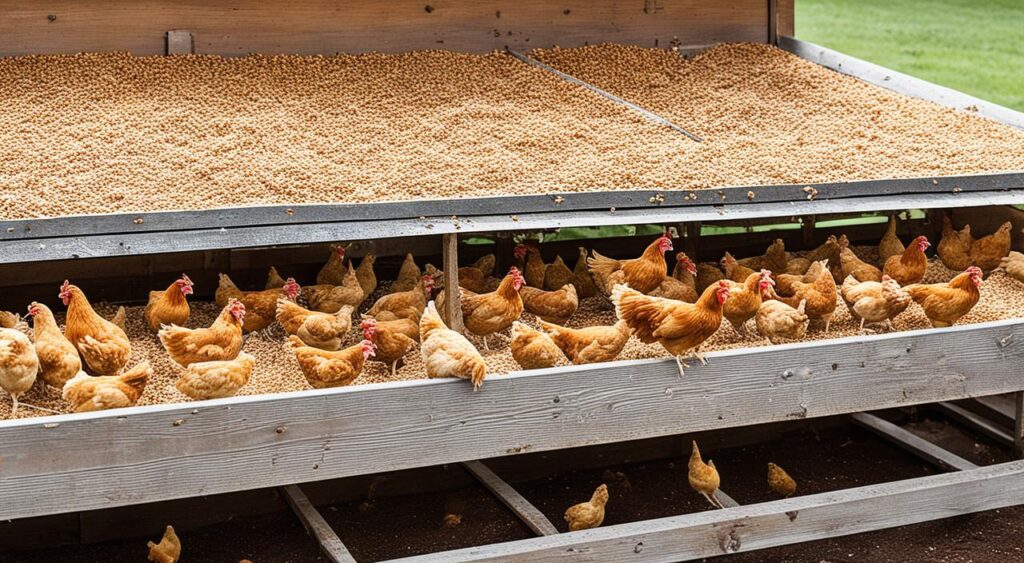
“Coccidiosis can be a major culprit in causing diarrhea and other digestive issues in chickens, particularly in younger birds. Proper prevention and control measures are essential to maintaining a healthy, productive flock.”
Fowl Cholera and Other Bacterial Diseases
Poultry owners need to watch out for bacterial diseases in chickens. These diseases can lead to serious chicken digestive issues and even death. Fowl cholera, also known as pasteurellosis, is a major concern.
Fowl cholera is a highly contagious disease caused by Pasteurella multocida. It affects chickens of all ages. Symptoms include severe poultry diarrhea remedies, breathing problems, loss of appetite, and a blue discoloration of the comb and wattles. The disease can come in acute and chronic forms, with the acute version often causing sudden death.
Infection usually happens through contaminated feed and water. There’s no cure for fowl cholera. The best way to fight it is through strict cleanliness and vaccines. Healthy birds in the flock and wild birds can spread the disease, so it’s key to manage chicken digestive issues well.
Chickens can also get other bacterial diseases, such as:
- Chronic Respiratory Disease (CRD) caused by Mycoplasma gallisepticum, which can stick around even with antibiotics
- Infectious coryza, which hits semi-mature to adult chickens and can make them carriers for life
- Infectious synovitis, caused by Mycoplasma synoviae, affecting both the lungs and joints
- Botulism, caused by Clostridium botulinum, which needs toxin removal to prevent
- Pullorum Disease and Fowl Typhoid, which can be deadly for adult birds
Managing these bacterial diseases in chickens is key to keeping your flock healthy and productive. Regular vet visits, strict cleanliness, and vaccines can help lower risks and keep your chickens well.
“Poultry owners must be vigilant when it comes to bacterial diseases in chickens, as they can cause severe chicken digestive issues and even death.”
Viral Diseases Causing Diarrhea
As poultry farmers, we face many challenges from viral diseases in chickens. Marek’s disease and Newcastle disease are two big culprits behind chicken diarrhea. Knowing about these viruses helps us protect our flocks better.
Marek’s Disease
Marek’s disease is a viral infection caused by the Marek’s disease virus. This virus can stay infectious for four to eight months. Chickens over 16 weeks old are most at risk, often showing paralysis in their wings or legs.
There’s no cure for Marek’s disease, but vaccines can protect our chickens.
Newcastle Disease
Newcastle disease is a major concern for chicken health. It’s caused by a very dangerous virus and can kill up to 80% of a flock. The virus spreads easily and there’s no cure.
Affected chickens must be put down to stop the disease from spreading further.
Viral diseases like Marek’s and Newcastle disease can really hurt our chicken flocks. By understanding these diseases, we can protect our birds and prevent diarrhea outbreaks. Keeping a close eye on our flocks and using good biosecurity is key to keeping them healthy and productive.
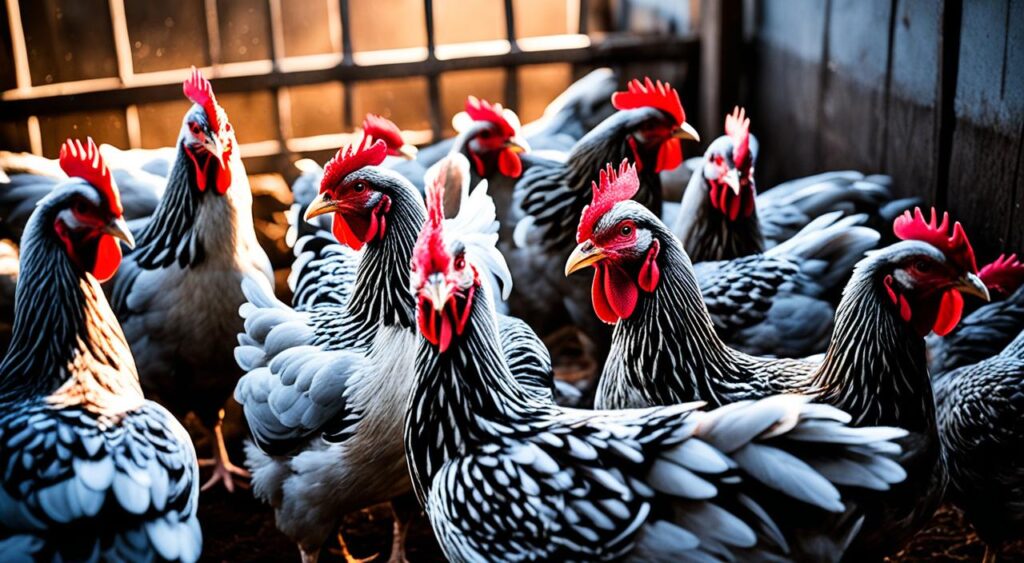
“Viral diseases in chickens can have a significant impact on the overall health and well-being of our poultry flocks.”
Gumboro Disease in Young Chicks
As poultry farmers, we face many challenges with viral diseases in chickens. Gumboro disease, or Infectious Bursal Disease (IBD), is a big problem for young chicks. It causes many health issues, like diarrhea, sleepiness, and even trembling of the head.
This disease usually hits chicks between 2 to 6 weeks old. It can kill up to 50% to 80% of them. The virus weakens their immune system, making them more likely to get other diseases. But, we can prevent and control it.
- Vaccination is key: Chicks should be vaccinated against Gumboro disease when they are 2 to 6 weeks old, typically through the drinking water.
- Proper biosecurity and flock management: Maintaining high levels of cleanliness and minimizing stress factors can help reduce the risk of Gumboro outbreaks.
- Prompt diagnosis and treatment: If Gumboro disease is suspected, it’s essential to seek veterinary assistance for accurate diagnosis and appropriate poultry diarrhea remedies.
By being vigilant and proactive, we can keep our young chicks safe from Gumboro disease. This helps keep our poultry healthy and productive.
“Early detection and proper management of Gumboro disease are crucial for the success of any poultry operation.”
Salmonellosis in Chickens
Salmonellosis is a serious bacterial disease that affects both young and adult chickens. It’s worrying because it can cause bad chicken digestive issues like diarrhea. It can also spread to humans through contaminated chicken products.
The Salmonella bacteria spread through contaminated feed, water, or feces. Sometimes, they can even be in eggs from infected hens. Not all chickens will show signs, but those that might have:
- Watery, poultry diarrhea remedies
- Lethargy
- Loss of appetite
- Dehydration
“Salmonellosis outbreaks can be particularly devastating, with mortality rates reaching up to 50% in some flocks.”
It’s important to prevent and treat Salmonellosis in chickens for their health and food safety. Good biosecurity, cleaning, and vaccines can lower the risk of bacterial diseases in chickens like Salmonellosis.
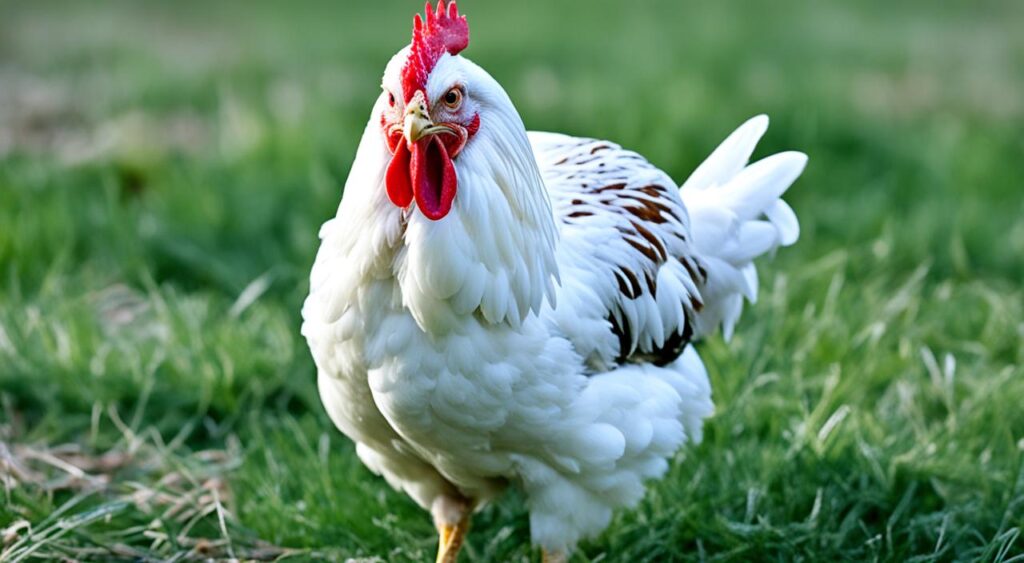
Quick action and vet help are crucial for Salmonellosis. Farmers should watch their flocks for chicken digestive issues and get help if they see poultry diarrhea remedies signs. With the right steps, the effects of this bacterial disease in chickens can be greatly reduced.
Treating Chicken Diarrhea
Dealing with chicken diarrhea can be tricky. The treatment depends on the cause and how bad it is. For mild, short-term diarrhea from eating something bad, just supportive care might do. But, if it’s serious or lasts a long time, you should get help from a vet. This is especially true if your bird looks tired, isn’t eating, losing weight, or has blood in its poop.
When to Seek Veterinary Assistance
If your chickens have any of these issues, see an avian vet:
- Prolonged or severe diarrhea that lasts more than a day or two
- Diarrhea accompanied by other concerning symptoms, such as lethargy, loss of appetite, or weight loss
- Diarrhea that contains blood or mucus
- Diarrhea in young chicks or newly introduced birds to your flock
Home Remedies and Supportive Care
For mild chicken diarrhea, you can try some poultry diarrhea remedies at home. This might include:
- Providing clean, fresh water with electrolytes and vitamins to prevent dehydration
- Using a product like Biostop to help bind the droppings and reduce the severity of the diarrhea
- Administering a dose of Beryl’s Friendly Bacteria to help repopulate the gut with beneficial microorganisms
- Offering a bland, easily digestible diet, such as boiled rice or scrambled eggs
- Reducing stress factors, such as extreme temperatures or changes in the flock’s environment
Home remedies can help with mild cases, but if diarrhea doesn’t get better or gets worse, see a vet. Getting the right diagnosis and treatment is key to treating chicken diarrhea. It’s important for your birds’ health and happiness.
Prevention Strategies for Chicken Diarrhea
Keeping your chicken flock healthy is key for their well-being and your poultry management. By using effective strategies to prevent diarrhea, you can lower the risk of outbreaks. This helps keep your chicken flock healthy.
Biosecurity and Flock Management
Good biosecurity is vital for preventing chicken diarrhea. This means keeping the coop clean and disinfected. Also, keep new birds in quarantine and separate different poultry species. Clean and disinfect the coop, feeders, and waterers regularly to remove infection sources.
Vaccination Programs
A strong vaccination program is key to protect your chickens from diseases like Marek’s, Newcastle, and Gumboro diseases. These diseases can cause diarrhea. Talk to your vet to create a vaccination plan for your flock.
Combining strong biosecurity and a good vaccination plan boosts your chickens’ health. It lowers the risk of diarrhea outbreaks. This leads to a thriving poultry operation.
“Preventive measures are the key to maintaining a healthy chicken flock and minimizing the occurrence of diarrhea. Investing in these strategies can save you time, money, and the heartache of dealing with sick birds.”
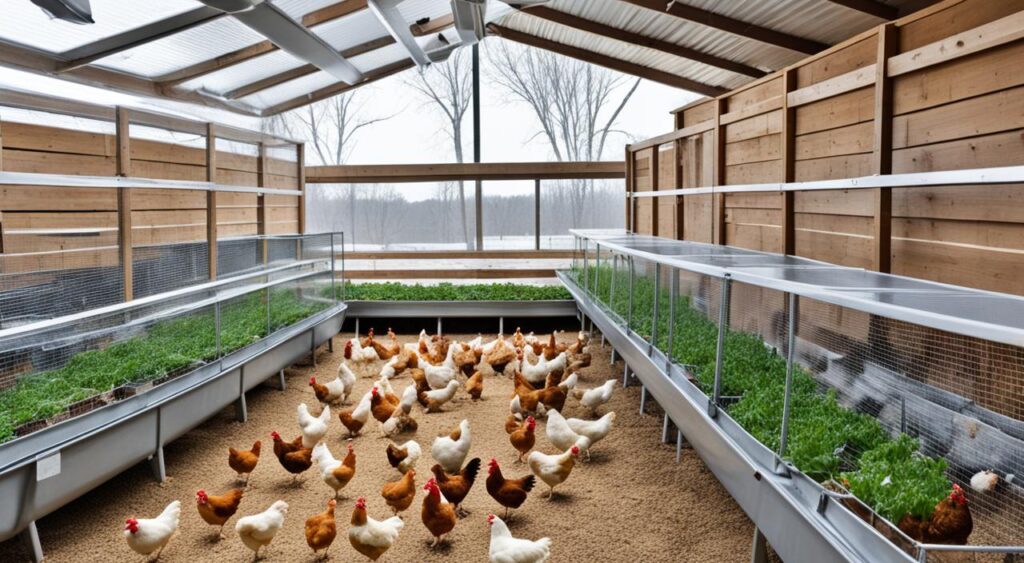
Being proactive in preventing chicken diarrhea is the best way to keep your flock healthy and your poultry operation successful. Focus on biosecurity, vaccination, and managing health to prevent diarrhea. This approach ensures a thriving, productive chicken flock.
Nutritional Factors and Diarrhea
Feeding your chickens right is key to their health. But, some foods can make them have diarrhea. Knowing how diet affects their health helps in finding poultry diarrhea remedies.
High-Protein Diets and Feed Quality
Feeds too rich in protein can cause chicken digestive issues. Too much protein can upset their stomach, leading to diarrhea. Also, bad feed from poor storage or contamination can cause stomach problems and poultry diarrhea remedies.
A study by Teirlynck et al. (2009) found that the type of cereal in feed affects chickens’ digestive health. Oviedo-Rondón (2019) stressed the link between gut health and overall chicken health. This shows the need for a complete approach to fix chicken digestive issues.
“Ensuring that chickens have access to a commercially formulated ration that is fresh, dry, and suitable for their age and species can help prevent diarrhea-related problems.” – Poultry Nutrition Expert
For a healthy gut and to avoid chicken digestive issues, feed chickens a balanced, quality diet. Check the feed often and adjust the protein levels if needed. This is a good way to stop poultry diarrhea remedies.
Understanding how diet affects chicken diarrhea helps owners and producers tackle these issues. By managing feed well and focusing on gut health, they can keep their flock healthy. This reduces the need for poultry diarrhea remedies.
Environmental Stressors and Diarrhea
Environmental factors like heat and dehydration can cause chicken digestive issues. These factors can lead to diarrhea. It’s important to give your chickens clean water and reduce heat stress to prevent diarrhea.
Heat Stress and Dehydration
When it gets hot, chickens can get heat stress. This stress can mess with their digestion and cause diarrhea. Studies show that fixing issues like bad temperature control and poor air flow can cut down on diarrhea.
Keeping your chicken coop cool and giving them avian electrolytes can help stop heat-related diarrhea.
Dehydration is also a big factor in diarrhea in chickens. Research finds that less environmental stress means fewer chickens get diarrhea. Keeping your birds hydrated and the coop in good shape can lower diarrhea risk.
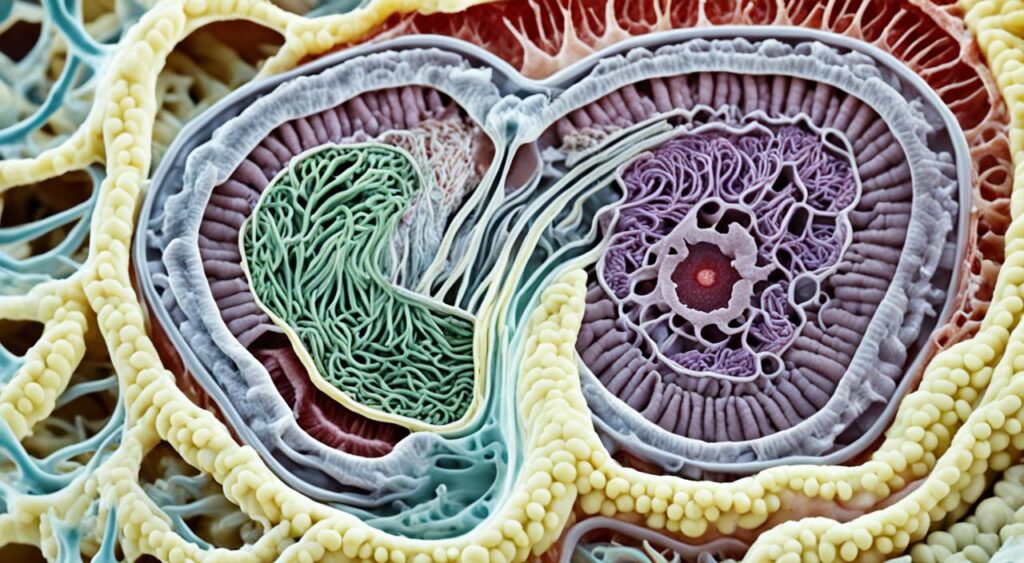
“Proper environmental management is crucial in preventing and managing diarrhea in chickens. Addressing heat stress and maintaining hydration can significantly improve the overall digestive health of your flock.”
Dealing with chicken digestive issues and poultry diarrhea remedies needs a detailed plan. Watch and manage your chicken coop’s conditions well. Taking steps to reduce heat stress and dehydration helps keep your chickens healthy.
Diagnosing the Cause of Diarrhea
Finding out why chickens have diarrhea can be tough. It could mean many different health issues. It’s key to work with a vet and use tests to figure it out.
Veterinary Testing and Diagnostics
If a chicken has ongoing or bad diarrhea, a vet might suggest some tests. These tests help find the main cause. Some tests include:
- Fecal sample analysis: Looking at a chicken’s poop can show if there are worms or other problems. It can also find bacteria or viruses causing the diagnosing chicken diarrhea.
- Blood tests: Checking a chicken’s blood can tell us about health problems. This could be things like organ issues or problems with the immune system.
- Endoscopic examinations: Sometimes, a vet might do an endoscopy. This lets them see inside the chicken’s stomach and find any problems or blockages.
Working with a vet and using these tests helps owners understand why their chickens have diarrhea. This way, they can make a plan to fix the problem.
“Accurate diagnosis is the key to effectively treating poultry digestive disorders and restoring the health of affected chickens.”
It’s important to diagnose quickly and correctly to keep chickens healthy. By working with a vet and using the right tests, owners can find and fix the cause of diarrhea in their chickens.
Conclusion
Diarrhea in chickens is a common issue that can be serious. It’s important to act fast and treat it right. Knowing what causes it, spotting the signs, and taking steps to prevent it can keep chickens healthy.
Worms, bacteria, viruses, and other health problems can cause chicken diarrhea. Keeping a close eye on things, following strict cleanliness rules, and feeding them well are key. Also, getting help from a vet when needed is important to find and treat the problem.
By tackling diarrhea in chickens early, farmers can save money and keep their chickens healthy and productive. Understanding the causes and taking steps to prevent it helps farmers deal with chicken diarrhea. This way, they can keep their flock in good shape.
FAQ
What are the common signs and symptoms of diarrhea in chickens?
A normal chicken dropping is white-topped and brown. Diarrhea makes droppings very loose or like water. It can also make the butt dirty with feathers stuck in droppings. Signs of illness include being very tired, not eating well, losing weight, and having ruffled feathers.
What are the major causes of diarrhea in chickens?
Worms, viruses (like rotavirus and adenovirus), and bacteria are big causes of diarrhea. Other illnesses that cause diarrhea include coccidiosis, fowl cholera, Marek’s disease, Gumboro disease, and salmonellosis.
What is coccidiosis and how can it cause diarrhea in chickens?
Coccidiosis is a disease from poor cleanliness and can cause diarrhea. Sick birds look bad, have bloody diarrhea, and may die young. To prevent it, keep different bird ages apart, use beneficial microorganisms in water, and clean the coop with lime.
What are the symptoms and prevention measures for fowl cholera and other bacterial diseases?
Fowl cholera makes chickens very sick with diarrhea and breathing issues. It can be chronic or deadly. It spreads through dirty feed and water. The best way to stop it is good hygiene and vaccines.
What are the key viral diseases that can cause diarrhea in chickens?
Marek’s disease can cause paralysis in older chickens. There’s no cure, but vaccines help. Newcastle disease is very serious, killing 30-80% of a flock. It spreads easily and has no cure, so sick birds must be killed.
How does Gumboro disease affect young chicks?
Gumboro disease hits young chickens hard, making them very sick. Symptoms include diarrhea, being very tired, and having ruffled feathers. It can kill 50-80% of them and weakens their immune system. Vaccines help prevent it.
What is salmonellosis and how can it cause diarrhea in chickens?
Salmonellosis is a bacterial disease that affects chickens. It spreads through dirty eggs, feed, water, and feces. Symptoms include diarrhea, but some birds may not show any signs.
When should I seek veterinary assistance for chicken diarrhea?
If diarrhea lasts a short time and is from eating too much, it might not need treatment. But, clean water with vitamins and electrolytes can help. For serious or ongoing diarrhea, see a vet, especially if there’s blood in the droppings.
What are some home remedies for treating chicken diarrhea?
Home remedies include using Biostop to stop the droppings. Then, give Beryl’s Friendly Bacteria to help the gut.
How can I prevent diarrhea in my chicken flock?
Good cleanliness and keeping the coop germ-free are key. Clean and disinfect the coop often. Keep different birds apart and use vaccines to protect against diseases like Marek’s, Newcastle, and Gumboro.
Can nutritional factors contribute to diarrhea in chickens?
Yes, bad nutrition can cause diarrhea. Feeds too high in protein or low quality can upset the gut. Make sure chickens eat a good, fresh ration made for their needs.
How can environmental factors like heat stress and dehydration cause diarrhea in chickens?
Heat and dehydration can make chickens sick with diarrhea. Keep water clean and cool. Use avian electrolytes to help with heat stress.
How can I determine the underlying cause of diarrhea in my chickens?
Finding the cause of diarrhea in chickens is hard. It can mean many different illnesses. See a vet and use tests like fecal samples to find the cause and treat it right.
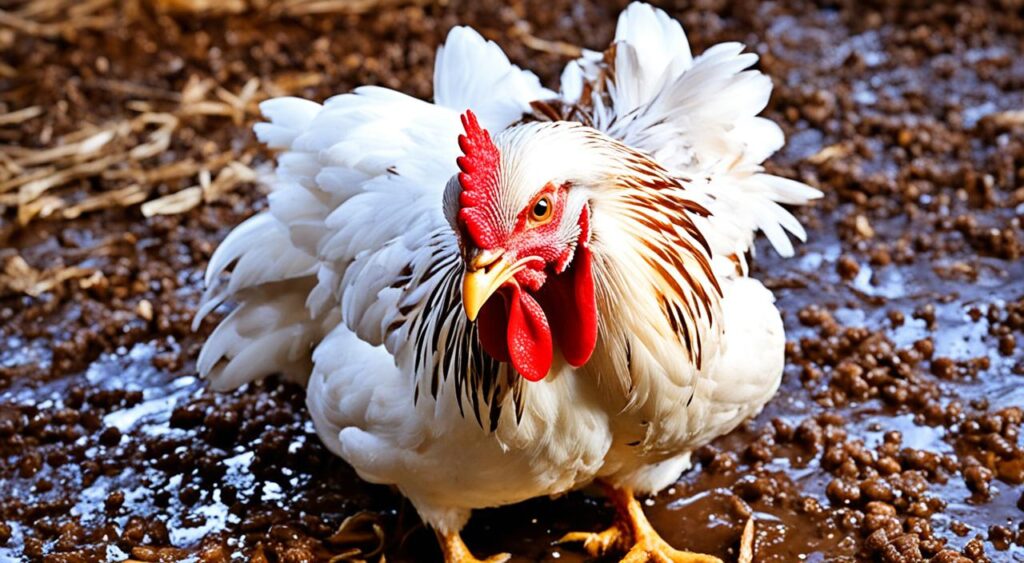

I’m extremely impressed together with your writing abilities and also with the layout
in your blog. Is this a paid subject or did you customize it your
self? Either way keep up the nice high quality writing, it’s uncommon to see a nice
blog like this one today. Stan Store alternatives!